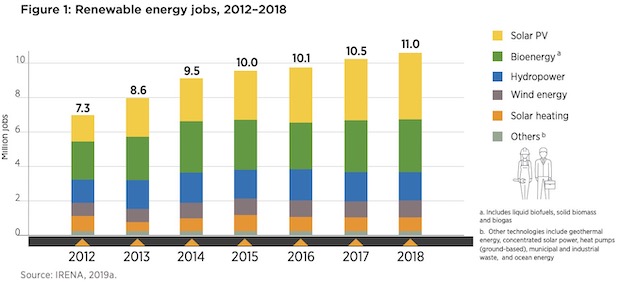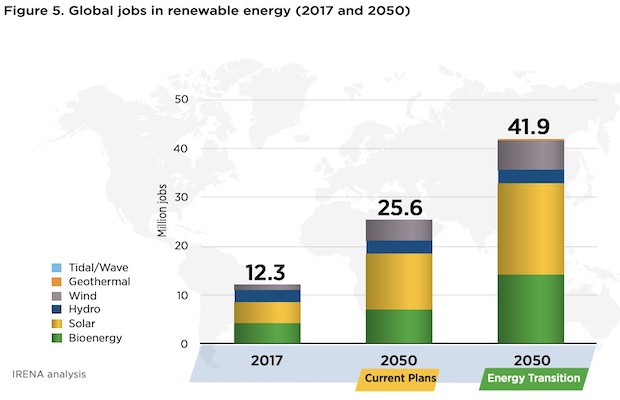Renewable Energy to Employ 42 Mn People by 2050, 26 Mn in Asia: IRENA

The number of people employed in renewable energy could reach 42 million globally by 2050, up from about 12 million in 2017, according to a recent report by the International Renewable Energy Agency (IRENA).
The report “Assessing the Impact of the Energy Transition” published recently points out that according to their latest edition estimates, in 2018 some 11 million people were employed worldwide in the renewables sector, up from 7.3 million in 2012 (IRENA, 2019a). The most rapid expansion has occurred in the solar photovoltaic (PV) industry, which now employs over 3.6 million people, putting it ahead of bioenergy, hydropower and wind power.
The agency also added that its socio-economic footprint work (IRENA, 2016a, 2017a, 2018a, 2019b, 2019c), based on integrated macroeconomic models, analyses the jobs’ footprint from transition roadmaps, exploring its sectoral distribution (renewables, energy sector, economy-wide) and associated misalignments, thereby informing policies for a just transition sees that by 2050, the number of people employed in renewable energy could reach 42 million worldwide.

The Energy Transition results in total renewable energy employment of 42 million jobs by 2050, up from about 12 million in 2017 – considerably more than the roughly 26 million expected under Current Plans. The solar workforce will be the sector’s largest, at close to 19 million, enjoying an expansion of 63 percent over that expected under Current Plans, followed by bioenergy (14 million) and wind (6 million). Hydropower will undergo a comparatively moderate growth of 7 percent compared to Current Plans, employing under 3 million people. Other renewable technologies are far less prominent but will also undergo expansion; jobs in the geothermal energy industry, for example, will increase by almost 60 percent by 2050 compared to the Current Plans figure. Overall, in 2050 the Energy Transition will generate 16 million jobs more than the Current Plans in the renewable energy sector.

Other key highlights:
- Coherent policy-making, adjusted for the economic and social context of each region, can deliver on climate and energy goals effectively and fairly.
- Accelerated uptake of renewables could boost total energy jobs to 100 million by 2050.
- Energy efficiency jobs would reach 21 million, with 21 percent higher growth than current plans indicate.
- Jobs in renewables could reach 42 million by 2050, some 62 percent more than under current plans.
- Asia could account for 64 percent of jobs in renewables by 2050, the Americas 15%, and Europe 10 percent.
- In terms of all energy jobs, Asia could have over 60 percent by 2050, the Americas 13 percent, and Europe 12 percent.
- Despite the largely positive impact of the transition, governments will have to address some inevitable misalignments along the way.
Source: saurenergy.com




